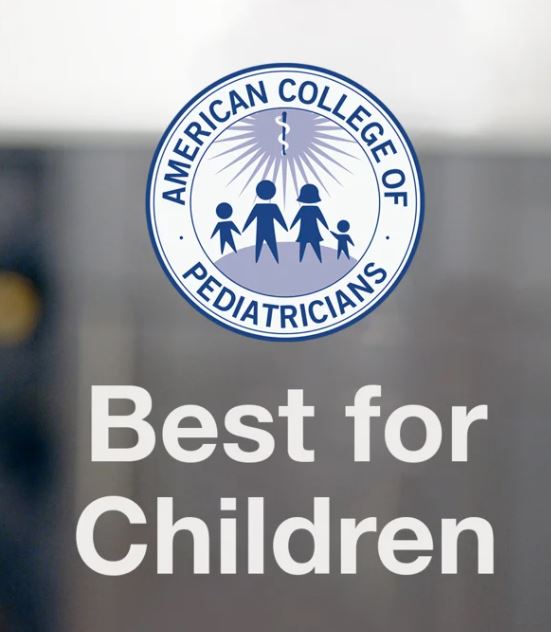In an updated statement published today, the American College of Pediatricians (ACPeds) affirms adoption as the best option for children who cannot be raised within their natural families. An appropriate adoptive family provides a child with love, permanency, stability, and the same legal rights as a child born into that family.
Dr. Leah Willson is a board-certified pediatrician, ACPeds director, and adoptive parent. She knows firsthand that an infant’s adoptive placement is a courageous, loving, and life-giving alternative to abortion. Dr. Wilson states, “Women experiencing a crisis pregnancy should receive counseling about options including open and semi-open adoption arrangements. Women considering abortion due to an adverse prenatal diagnosis should also be informed of the availability of adoptive families for children born with disabilities.”
Older children needing adoptive placement outside their natural families have often experienced multiple adverse childhood experiences (ACEs). They are at significant risk for emotional, behavioral, and developmental concerns, which can be alleviated by a healthy family environment. Since scientific studies consistently demonstrate that lifetime outcomes are best for children in low-conflict, married mother-father households, children to be adopted should be placed into that setting when possible.
All adoption decisions should be made with the best interests of the child foremost. Adoption policies should reflect adults’ commitment to meeting the child’s needs, rather than the child fulfilling the needs or wishes of the adults.
FULL STATEMENT:
ABSTRACT
The American College of Pediatricians affirms adoption as the best option for children who cannot be raised within their natural families. An appropriate adoptive family provides a child with love, permanency, stability, and the same legal rights as a child born into that family.
Adoptive placement of an infant should be promoted as a courageous, loving, and life-giving alternative to abortion. A woman in a crisis pregnancy should receive counseling about options including open and semi-open adoption arrangements. If a woman is considering abortion due to an adverse prenatal diagnosis, she should also be informed of the availability of adoptive families for children born with disabilities.
The ACPeds encourages families who wish to adopt to consider working through the foster care system. Many U.S. children are in need of a home, and many foster children are or will become available for adoption.
Children needing adoptive placement outside their natural families often have experienced multiple adverse childhood experiences and are at significant risk for emotional, behavioral, and developmental concerns.1 Since scientific studies consistently demonstrate that lifetime outcomes are best for children in a low-conflict, married mother-father household, children to be adopted should be placed into that setting when possible.2
All adoption decisions should be made with the best interests of the child foremost. Adoption policies should reflect adults’ commitment to meeting the needs of the child, rather than the child fulfilling the needs or wishes of the adults.
All adoptions should maintain strict legal and ethical standards. International treaties on adoption should be honored. Prospective parents or agencies that deliberately falsify adoption applications should be prosecuted.
The College supports those court decisions declaring that persons have no inherent “right to adopt.” Adoption decisions should not be subject to “non-discrimination” laws. In making child placement decisions, all agencies have a duty to consider potential adoptive parents’ age, sex, health, family structure, and ethnicity, among other factors. Every agency also makes value-based judgments regarding applicants’ lifestyle, parenting skills, religious practices, legal history, and financial status. Accordingly, the College strongly supports the civil right of faith-based agencies to operate under policies that adhere to their religious beliefs and moral standards.
Leah Willson, MD, FCP
Original statement June 2008
Revised April 2013
Revised January 2021
The American College of Pediatricians is a national medical association of licensed physicians and healthcare professionals who specialize in the care of infants, children, and adolescents. The mission of ACPeds is to enable all children to reach their optimal, physical and emotional health and well-being.
A PDF of this statement is available by clicking here: Adoption
Additional Resources
For an extensive review of the scientific evidence for the benefits of marriage and mother-father parenting to children’s mental and emotional health, see the American College of Pediatricians position statements Marriage and the Family (Trumbull and Cretella, 2014), and Homosexual Parenting: a Scientific Analysis (Trumbull and Cretella, 2019).
The National Down Syndrome Adoption Network https://www.ndsan.org has a registry of families who are “ready and waiting” to adopt children with Down syndrome. CHASK (Christian Homes and Special Kids at CHASK.org) have resources for parents facing adverse prenatal diagnosis, as well as listings of families willing to accept children with many types of disabilities including life-limiting conditions. In addition, most adoption agencies have experience placing children with special needs.
The American College of Pediatricians is a national medical association of licensed physicians and healthcare professionals who specialize in the care of infants, children, and adolescents. The mission of the College is to enable all children to reach their optimal, physical and emotional health and well-being.
References
- Anthony RE, Paine AL.; Shelton KH. Adverse Childhood Experiences of Children Adopted from Care: The Importance of Adoptive Parental Warmth for Future Child Adjustment. Int. J. Environ. Res. Public Health 2019, 16, 2212
- Blackwell DL. Family Structure and Children’s Health in the United States: Findings from the National Health Interview Survey, 2001-2007. National Center for Health Statistics. Vital Health Stat 10 (246), 2010.
















